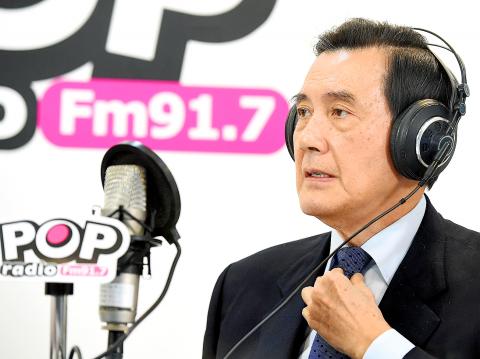The Chinese Nationalist Party (KMT) must clarify its stance on the so-called “1992 consensus,” former president Ma Ying-jeou (馬英九) said yesterday, adding that Chinese President Xi Jinping’s (習近平) definition of the term is different from that of the KMT’s.
Ma made the remarks during an interview with Pop Radio talk show host Huang Kuan-chin (黃光芹) the day after Xi in a speech in Beijing announced a plan to explore the “one country, two systems” formula for Taiwan and said that “national unification” is part of the “1992 consensus.”
While Xi’s view of the “consensus” differs from that of the pan-blue camp, the basic outline remains the same, Ma said.

Photo: Chu Pei-hsiung, Taipei Times
Xi’s continued emphasis on unification reflects a personal sense of urgency, as he had in 2013 stated that the issue should not be put off from generation to generation, Ma said.
Xi’s comments were a direct response to President Tsai Ing-wen’s (蔡英文) “four musts” in her New Year’s address, Ma said, adding that her rhetoric is causing the two sides to drift further apart.
Ma rejected the notion that acknowledging the “1992 consensus” equates to embracing the “one country, two systems” concept, saying that the KMT’s definition has always been a stop-gap prior to unification.
The clause “with each side having its own interpretation of what ‘China’ means” is only an issue prior to unification, and would not be a problem afterward, the former president said.
Ma criticized Tsai for misunderstanding the “consensus” and said that while Taiwan should maintain the “status quo,” it should not be averse to negotiating unification at the right time.
Former president Chiang Ching-kuo (蔣經國) responded to former Chinese leader Deng Xiaoping’s (鄧小平) “one country, two systems” proposal by saying: “A country needs only one good system,” Ma said.
The “1992 consensus” is the most important political foundation for cross-strait relations, Ma added.
He dismissed a question asking if he would hypothetically represent the KMT to respond to Xi’s proposal to “negotiate the ‘two systems’” and declined to comment further.
Ma also called on Tsai’s administration to allow local governments to initiate talks with their Chinese counterparts.
Local governments cannot represent the central government when negotiating policy, Ma said, adding that even when former KMT chairman Lien Chan (連戰) met with then-Chinese president Hu Jintao (胡錦濤) in 2005, they only exchanged visions of the future.

Japanese footwear brand Onitsuka Tiger today issued a public apology and said it has suspended an employee amid allegations that the staff member discriminated against a Vietnamese customer at its Taipei 101 store. Posting on the social media platform Threads yesterday, a user said that an employee at the store said that “those shoes are very expensive” when her friend, who is a migrant worker from Vietnam, asked for assistance. The employee then ignored her until she asked again, to which she replied: "We don't have a size 37." The post had amassed nearly 26,000 likes and 916 comments as of this

US President Donald Trump said "it’s up to" Chinese President Xi Jinping (習近平) what China does on Taiwan, but that he would be "very unhappy" with a change in the "status quo," the New York Times said in an interview published yesterday. Xi "considers it to be a part of China, and that’s up to him what he’s going to be doing," Trump told the newspaper on Wednesday. "But I’ve expressed to him that I would be very unhappy if he did that, and I don’t think he’ll do that," he added. "I hope he doesn’t do that." Trump made the comments in

Tourism in Kenting fell to a historic low for the second consecutive year last year, impacting hotels and other local businesses that rely on a steady stream of domestic tourists, the latest data showed. A total of 2.139 million tourists visited Kenting last year, down slightly from 2.14 million in 2024, the data showed. The number of tourists who visited the national park on the Hengchun Peninsula peaked in 2015 at 8.37 million people. That number has been below 2.2 million for two years, although there was a spike in October last year due to multiple long weekends. The occupancy rate for hotels

A cold surge advisory was today issued for 18 cities and counties across Taiwan, with temperatures of below 10°C forecast during the day and into tonight, the Central Weather Administration (CWA) said. New Taipei City, Taipei, Taoyuan and Hsinchu, Miaoli and Yilan counties are expected to experience sustained temperatures of 10°C or lower, the CWA said. Temperatures are likely to temporarily drop below 10°C in most other areas, except Taitung, Pingtung, Penghu and Lienchiang (Matsu) counties, CWA data showed. The cold weather is being caused by a strong continental cold air mass, combined with radiative cooling, a process in which heat escapes from